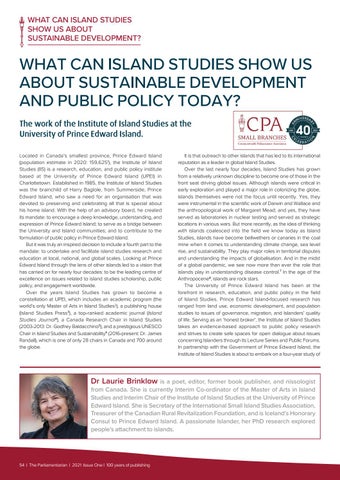WHAT CAN ISLAND STUDIES SHOW US ABOUT SUSTAINABLE DEVELOPMENT?
WHAT CAN ISLAND STUDIES SHOW US ABOUT SUSTAINABLE DEVELOPMENT AND PUBLIC POLICY TODAY? The work of the Institute of Island Studies at the University of Prince Edward Island. Located in Canada’s smallest province, Prince Edward Island (population estimate in 2020: 159,6251), the Institute of Island Studies (IIS) is a research, education, and public policy institute based at the University of Prince Edward Island (UPEI) in Charlottetown. Established in 1985, the Institute of Island Studies was the brainchild of Harry Baglole, from Summerside, Prince Edward Island, who saw a need for an organisation that was devoted to preserving and celebrating all that is special about his home island. With the help of an advisory board, he created its mandate: to encourage a deep knowledge, understanding, and expression of Prince Edward Island; to serve as a bridge between the University and Island communities; and to contribute to the formulation of public policy in Prince Edward Island. But it was truly an inspired decision to include a fourth part to the mandate: to undertake and facilitate island studies research and education at local, national, and global scales. Looking at Prince Edward Island through the lens of other islands led to a vision that has carried on for nearly four decades: to be the leading centre of excellence on issues related to island studies scholarship, public policy, and engagement worldwide. Over the years Island Studies has grown to become a constellation at UPEI, which includes an academic program (the world’s only Master of Arts in Island Studies2), a publishing house (Island Studies Press3), a top-ranked academic journal (Island Studies Journal4), a Canada Research Chair in Island Studies (2003-2013: Dr. Godfrey Baldacchino5), and a prestigious UNESCO Chair in Island Studies and Sustainability6 (2016-present: Dr. James Randall), which is one of only 28 chairs in Canada and 700 around the globe.
Dr Laurie Brinklow
It is that outreach to other islands that has led to its international reputation as a leader in global Island Studies. Over the last nearly four decades, Island Studies has grown from a relatively unknown discipline to become one of those in the front seat driving global issues. Although islands were critical in early exploration and played a major role in colonizing the globe, islands themselves were not the focus until recently. Yes, they were instrumental in the scientific work of Darwin and Wallace and the anthropological work of Margaret Mead; and yes, they have served as laboratories in nuclear testing and served as strategic locations in various wars. But more recently, as the idea of thinking with islands coalesced into the field we know today as Island Studies, islands have become bellwethers or canaries in the coal mine when it comes to understanding climate change, sea level rise, and sustainability. They play major roles in territorial disputes and understanding the impacts of globalisation. And in the midst of a global pandemic, we see now more than ever the role that islands play in understanding disease control.7 In the age of the Anthropocene8, islands are rock stars. The University of Prince Edward Island has been at the forefront in research, education, and public policy in the field of Island Studies. Prince Edward Island-focused research has ranged from land use, economic development, and population studies to issues of governance, migration, and Islanders’ quality of life. Serving as an ‘honest broker’, the Institute of Island Studies takes an evidence-based approach to public policy research and strives to create safe spaces for open dialogue about issues concerning Islanders through its Lecture Series and Public Forums. In partnership with the Government of Prince Edward Island, the Institute of Island Studies is about to embark on a four-year study of
is a poet, editor, former book publisher, and nissologist from Canada. She is currently Interim Co-ordinator of the Master of Arts in Island Studies and Interim Chair of the Institute of Island Studies at the University of Prince Edward Island. She is Secretary of the International Small Island Studies Association, Treasurer of the Canadian Rural Revitalization Foundation, and is Iceland’s Honorary Consul to Prince Edward Island. A passionate Islander, her PhD research explored people’s attachment to islands.
54 | The Parliamentarian | 2021: Issue One | 100 years of publishing
